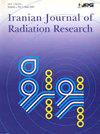46.5keV-1408keV伽马射线能量环境样品的质量衰减系数
Q4 Health Professions
引用次数: 2
摘要
背景:在用于散装样品放射性分析的伽马射线光谱法中,当试样的衰减率与效率校准源的衰减率不同时,需要进行自衰减校正。因此,测试样品的质量衰减系数是伽马射线光谱法中的一个重要因素。本研究估算了七种环境样品的质量衰减系数。材料和方法:使用带有高纯度锗探测器系统的未准直透射系统来测量有测试样品和没有测试样品的伽马射线透射率。使用C(活性炭)、H2O、MnO2、NaCl、Na2CO3和(NH4)2SO4作为参考材料对系统进行校准。选择海洋沉积物、表层土壤、鱼类、海藻、大白菜、牛奶和松针,并使用该系统对每种样本类型的10个相同样本进行测试。结果:通过K2CrO4和SiO2的实验和计算,验证了未准直透射系统的校准,线性衰减系数在4%以内具有良好的一致性。每种样品的质量衰减系数的标准偏差估计为在100keV以上小于5%。结论:对于高于100keV左右的伽马射线能量,质量衰减系数与样品类型无关,但即使使用类似类型的样品,也应考虑较低伽马射线能量的质量衰减系数。本文列出的质量衰减系数可作为环境样品伽马射线光谱法的参考或可比值。本文章由计算机程序翻译,如有差异,请以英文原文为准。
Mass attenuation coefficients of environmental samples for gamma-ray energies from 46.5 keV to 1408 keV
Background: In gamma-ray spectrometry for the radioactivity analysis of bulk samples, self-attenuation correction is necessary when the attenuation rates in test sample differ from the one in the efficiency calibration source. Thus, the mass attenuation coefficient of test samples is an important factor in gamma-ray spectrometry. This study estimates the mass attenuation coefficients for seven kinds of environmental samples. Materials and Methods: An uncollimated transmission system with a high purity germanium detector system was used to measure the gamma-ray transmission rates with and without test samples. The system was calibrated using C (activated charcoal), H2O, MnO2, NaCl, Na2CO3, and (NH4)2SO4 as reference materials. Sea sediment, surface soil, fish, seaweed, Chinese cabbage, milk, and pine needles were selected, and ten identical samples for each sample type were tested using the system. Results: The calibration of the uncollimated transmission system was validated with good agreement within 4% between linear attenuation coefficients by experiment and calculation for K2CrO4 and SiO2. The standard deviation of the mass attenuation coefficients for each kind of sample was estimated as less than 5% above around 100 keV. Conclusion: Mass attenuation coefficient does not significantly depend on the sample type for gamma-ray energy higher than around 100 keV, but mass attenuation coefficient for the lower gamma-ray energy should be considered even with similar kinds of sample. The mass attenuation coefficients tabulated in this paper can be used as a reference or comparable value in gamma-ray spectrometry for environmental samples.
求助全文
通过发布文献求助,成功后即可免费获取论文全文。
去求助
来源期刊

Iranian Journal of Radiation Research
RADIOLOGY, NUCLEAR MEDICINE & MEDICAL IMAGING-
CiteScore
0.67
自引率
0.00%
发文量
0
审稿时长
>12 weeks
期刊介绍:
Iranian Journal of Radiation Research (IJRR) publishes original scientific research and clinical investigations related to radiation oncology, radiation biology, and Medical and health physics. The clinical studies submitted for publication include experimental studies of combined modality treatment, especially chemoradiotherapy approaches, and relevant innovations in hyperthermia, brachytherapy, high LET irradiation, nuclear medicine, dosimetry, tumor imaging, radiation treatment planning, radiosensitizers, and radioprotectors. All manuscripts must pass stringent peer-review and only papers that are rated of high scientific quality are accepted.
 求助内容:
求助内容: 应助结果提醒方式:
应助结果提醒方式:


